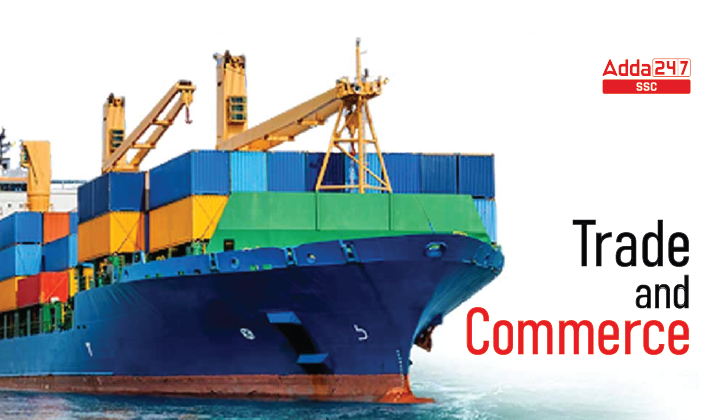Trade and Commerce
Trade and Commerce are often interchangeable terms. But in actual terms they have different meanings. The term commerce is much broader than that of trade. Commerce deals with vital factors responsible for an exchange of goods & services apart from the transaction itself.
Trade: It is the transfer of ownership of goods and services. This shift of ownership happens through transaction of money. In earlier times, barter system was primarily used for trade, where goods and services were exchanged in return for other products or services. The use of money has made trading faster and smoother.
Commerce: commerce includes all the activities necessary to facilitate trade, which means to deliver goods or services from manufacturers to consumers. These activities include transportation, banking and insurance services, advertisement and storage facilities like cold stores, warehouses, etc. to complete this entire process successfully. All these activities together form commerce.
Difference Between Trade and Commerce?
Though trade and Commerce are interchangeable terms in common parlance, they differ in their actual meaning and scope. These differences can be be summarised as the following:
1. Trade is selling and buying goods in exchange for money. However, commerce is the entire process of delivering products from manufacturers to consumers. It comprises factors like transportation, banking and insurance, warehousing etc.
2. Commerce has much wider range than trade. Where trade is limited to the selling and purchasing of products, commerce includes all the activities vital to making a trade possible.
3. Trade has a more social perspective attached to it as it satisfies the needs of both the seller and the buyer. On the other hand, commerce is more economical which aims to generate revenue.
4. Trade is mostly a single time affair between two parties- buyer and seller. On the other hand, commerce is a regular affair, and it occurs on a daily basis between parties involved.
5. Trade & Commerce differs in Capital requirements. Trade needs more scaled capital as it requires an inventory. Sellers have to keep stock available to meet their customer’s demands and buyers have to keep the cash ready for payments. On the other hand, commerce requires less capital in scalable terms, as all the parties are financially responsible for their set of duties.
Trade and Commerce Minister of India
Piyush Goyal is the Minister of Commerce and Industry. He assumed office on 30th May 2019. In his tenure as Minister of Commerce & Industry, India achieved its highest ever exports of about $675 billion in 2021-22. He led the signing of a Free Trade Agreement (FTA) with UAE, the fastest ever negotiated FTA globally and the India-Australia Economic Cooperation and Trade Agreement (ECTA) which is India’s 1st agreement with a developed country after a decade.
Trade and Commerce in Indian Constitution
Article 301 to 307 in Part 13 of the Indian constitution deal with the trade, commerce and intercourse within the territory of India. Article 301 declares that trade, commerce and intercourse throughout the territory of India shall be free. However, article 302-305 imposes some restrictions on the above. These restrictions are:
Restriction can be imposed by the Parliament to safeguard public interest. However, no discrimination can be made between states while imposing such restrictions,
Legislature of a state can impose reasonable restrictions on the freedom of trade and commerce to safeguard public interest. But, a bill for this purpose can only be introduced in the state legislature with the prior recommendation of the President.
Freedom under Art 301 can be curtailed subject to nationalization laws. Both Parliament and state can make laws in this regard.
Also, Parliament has been authorised to appoint an appropriate authority for carrying out the purposes of the above provisions relating to Art 301. But no such authority has been appointed so far.
Latitude and Longitude of India
Trade and Commerce – FAQs
Q. Which Article of the Indian constitution provides for freedom of Trade & Commerce?
Ans. Article 301 of the constitution provides for freedom of Trade & Commerce.
Q. Who is the Minister of Commerce and Industry in India?
Ans. Piyush Goyal is the Minister of Commerce and Industry.



 Upcoming Government Exams, Complete Govt...
Upcoming Government Exams, Complete Govt...
 Govt Jobs 2025, Latest Upcoming Governme...
Govt Jobs 2025, Latest Upcoming Governme...
 SSC Exam Calendar 2025–26 Out, Check All...
SSC Exam Calendar 2025–26 Out, Check All...









